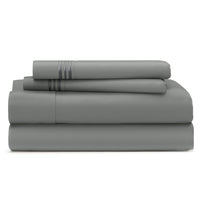
7 Houseplants for Low Light Spaces
Regardless of where you place them, houseplants can transform any space from dull to full of life. However, most people don’t have enough windows to provide sunlight to higher-maintenance plants. While it’s a common misconception that plants need an abundance of light to thrive, there are plenty of houseplants that do just fine in a more dimly lit room.
Read on to learn about the most popular low light houseplants.

Tiger Fern
A natural mutation of the Boston Fern, the Tiger Fern is a tropical, jungle-like fern with green leaves and yellow stripes. This beautiful tiger patterned plant is native to the tropical forest floors of Central America, South America, and the West Indies. Since it’s accustomed to low, indirect sunlight, it’s the perfect houseplant for a plant newbie. With a full-grown leaf spread of almost three feet, it looks great in a hanging basket or on a high pedestal.
Care Instructions: The Tiger Fern grows best in indirect sunlight that mimics its tropical forest floor habitat. To keep your fern looking green and full, place it a few feet away from a window out of direct sun. It thrives in humidity, so it would be an awesome touch to your bathroom.
No worries if you plan to grow it elsewhere, though! The Tiger Fern can grow in any space as long as you water it thoroughly every one-to-two weeks and hand mist it every few days to mimic the humidity of the tropical forest.

Victoria Fern
Another resilient fern, the Victoria Fern is a beautiful and elegant addition to any living space! Its wavy bright green leaves arise from a central rosette, growing up to two feet long at full maturity. This vibrant flora is a variety of the Bird’s Nest Fern, a native tropical plant that typically grows at the base of palm trees. Their fronds can grow up to two feet long under the right conditions.
Care Instructions: Similarly to the Tiger Fern, the Victoria Fern thrives in medium indirect sunlight. It requires moderate humidity and adequate drainage, so make sure to pot it in a holed container and keep its soil moist by watering it every one-to-two weeks. Unlike other ferns, make sure to only water the central rosette so it can soak up the water fully.

Red Maranta
Also called the “red-veined prayer plant”, the Red Maranta is a widely popular houseplant native to Brazil. If you’re looking to add a pop of color to your room, this is the plant for you. The Red Maranta features bright green leaves with dark red veins running through the spine of the leaves. Add it to a room as a pop of color or even use it as a color scheme--its red veins pair nicely with maroon or burgundy bedding.
The term “prayer plant” is inspired by the plant’s response to light. During the day, its leaves are flat and open to absorb sunlight, but at night they move upwards and “pray” to conserve moisture.
Care Instructions: Another low light houseplant, Red Marantas grow best in very dim indirect sunlight. To see your plant grow to its full potential of one full foot tall, place it near a northern window in a more dimly lit room. When watering, make sure the soil is always moist, but never too damp. Watering every nine days is typically recommended to start. Unlike other houseplants on our list, Red Marantas prefer a warmer climate than most people usually live in. It’s ideal to grow your Maranta in warmer indoor spaces anywhere from 70 to 75 degrees. If you prefer your home to be a little warmer, this one’s for you!

Monstera Deliciosa
Nicknamed the “swiss cheese plant”, this trendy houseplant can be found in a fair share of your favorite lifestyle influencers’ Instagram photos. The Monstera Deliciosa has become increasingly popular in homes, schools, and workplaces for its holed leaves that resemble that of swiss cheese holes. While the holes give the plant a quirky personality of its own, they also maximize sun capture, making it so the Monstera only needs minimal light. This feature came from the plant’s adaptation to living on the forest floors of Central America, where it receives little direct sunlight.
To uphold the Monstera Deliciosa’s fun and youthful vibe, consider adding vibrant pops of color throughout the room you place it in. A bright throw blanket is a great addition to any living area or bedroom. As a bonus, Monsteras are known to be one of the most effective plants at filtering air.
Care Instructions: As another relatively low maintenance houseplant, water your Monstera every one to two weeks, allowing its soil to completely dry out before watering again. Since the Monstera Deliciosa can maximize sun capture with its holes, it only needs minimal light to flourish. Medium indirect sunlight and regular indoor temperatures of 65 to 75 degrees are ideal for the plant to reach its full growth of a whopping 10-to-15 feet tall.
However, parents and pet owners be warned: the Monstera plant can be irritating to animals and humans if ingested — make sure to keep it out of reach of pets and small children.

Philodendron 'Lemon Lime'
The Philodendron may be the most popular low light houseplant solely for its resilience and low maintenance levels. Its trailing foliage can grow up to 12 feet long in almost any level of sunlight, making it ideal for hanging baskets and pedestals all over the home, office, and other spaces. The Lemon Lime Philodendron is especially stunning because its bright yellow foliage can bring any room to life.
Care Instructions: The Lemon Lime Philodendron can thrive in all lighting conditions, but prefers indirect sunlight. Water the plant thoroughly every couple of weeks, making sure to let the soil dry out fully before watering again. When in doubt, wait to water the Philodendron — it prefers to be underwatered rather than overwatered. If you have pets and children that try to snack on your houseplants, keep the Philodendron out of reach as it’s toxic to both animals and humans.

Fluffy Ruffle Fern
Another type of Boston Fern, the Fluffy Ruffle Fern is as fun as its name. Its bright green foliage is comprised of soft ruffled leaves that create a dense, neat clump. It’s quite versatile and can be grown in many different-sized containers as long as they have draining holes. To liven up a room, place this fern as decoration on a small table or hang it from the ceiling in a basket. It can grow up to three feet long at full maturity, so make sure you have ample space before committing to a Fluffy Ruffle Fern!
Care Instructions: This type of fern thrives in humidity. To recreate the humidity of its rainforest habitat, make sure to do a daily misting or place a water-filled saucer underneath the pot. It can endure most typical indoor temperatures of 50 to 80 degrees, but prefers more moderate climates. To keep your fern happy and healthy, place it near a north or east-facing window to receive bright indirect sunlight.

Calathea 'White Star'
Last, but certainly not least, the White Star Calathea is another beautiful patterned plant from the family of praying plants. Hailing from the Amazon Rainforest, its leaves feature bright white stripes and a pinkish coloring near the midribs. Its stems are long and thin, extending into a large, lengthy leaf. The White Star can grow up to five feet tall at full maturity, making it the perfect plant to pull a room together.
Care Instructions: As yet another plant that grows on the shady rainforest floor, the White Star prefers to be placed a few meters from a window in indirect sunlight. If your window seems too bright, consider adding a sheer curtain to further replicate the shady rainforest environment. It’s best to water the Calathea as soon as the first inch of soil gets dry, typically every 10 days or so. Good news! It’s also non-toxic to humans and pets. Although we don’t suggest you eat it, it won’t do any harm to pets or children that may happen to sneak a bite.
Want to add even more to your space? Be sure to check out Cosy House Collection’s line of products to upgrade your home even more!
We've gone ahead & enclosed a 10% off coupon below for you to use if you'd like to take the plunge and try out our sheets for yourself! To shop our collection & get 10% OFF Use the code 'BLOG10' at checkout.


